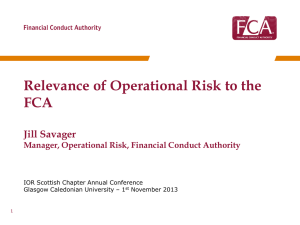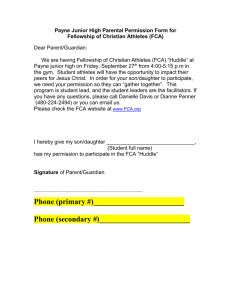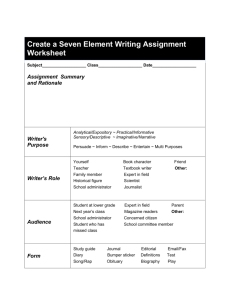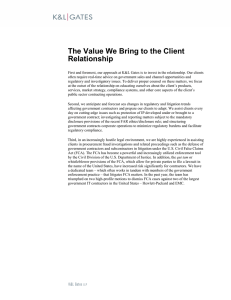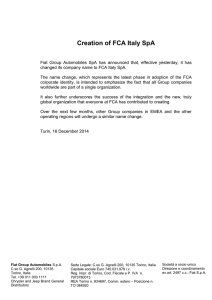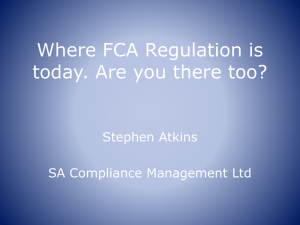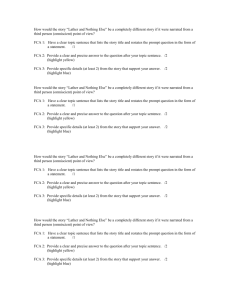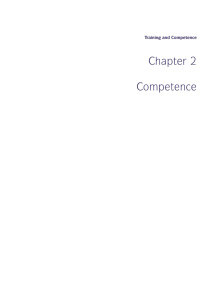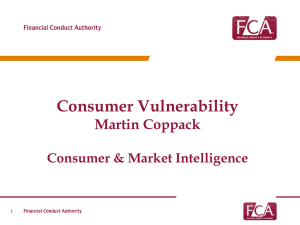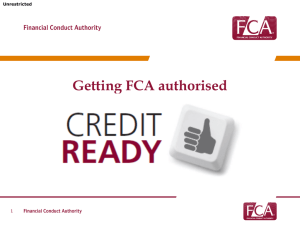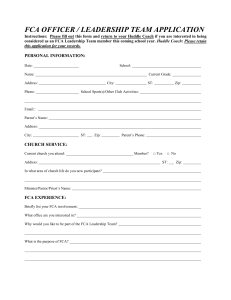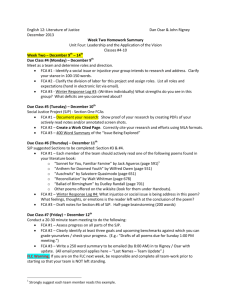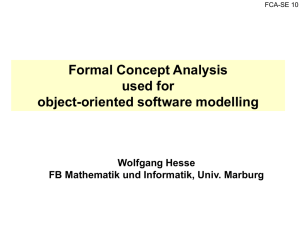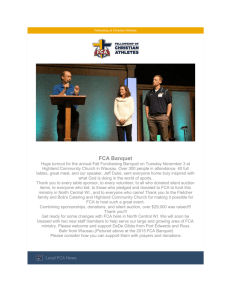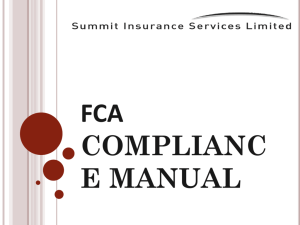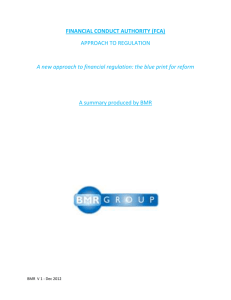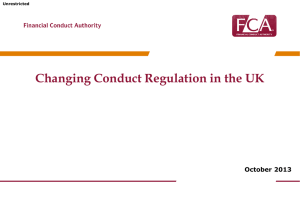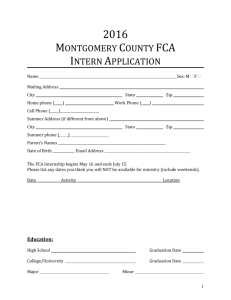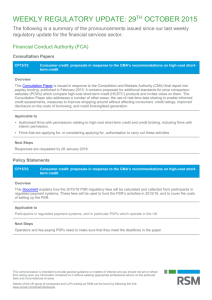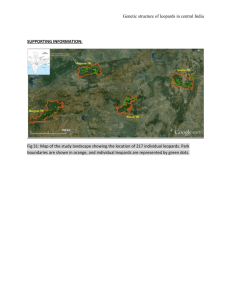Conduct regulation, roundtable and discussion
advertisement
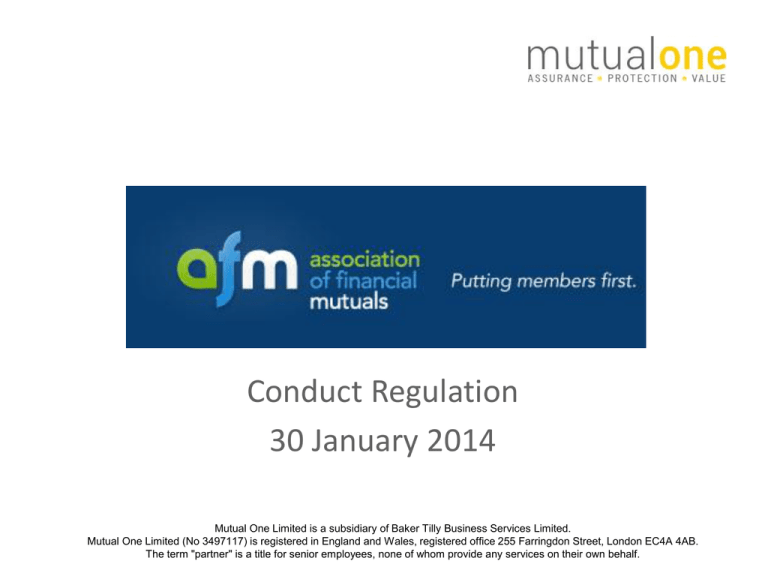
Conduct Regulation 30 January 2014 Mutual One Limited is a subsidiary of Baker Tilly Business Services Limited. Mutual One Limited (No 3497117) is registered in England and Wales, registered office 255 Farringdon Street, London EC4A 4AB. The term "partner" is a title for senior employees, none of whom provide any services on their own behalf. Agenda The FCA Approach Conduct Regulation Key Conduct Risks Discussion The FCA Approach Conduct Risk goes far beyond the six Treating Customers Fairly outcomes The key principle for firms to consider is Principle 6: A firm must pay due regard to the interests of its customers and treat them fairly. The FCA Approach The FCA’s approach to conduct risk is based on: • Governance and Culture • Product Design and Governance • Sales and Transactions Processes • Post Sales Handling Conduct Risk Regulation Governance People Strategy Oversight Structure Reward and Remuneration • Right persons in the right positions – alignment of skill sets • Persons need to have correct training – specific to their roles • Persons need to feel able to identify, highlight and challenge areas where they feel there is undue conduct risk. • There is a need for clarity in the firm’s strategy and risk appetite • All stakeholders need to understand how the strategy and firm’s conduct risk appetite links to the business model, products on offer, the distribution cycle, and operational approach. • Board • Sub-Committees • Working Parties • Embedded within change management processes. • Reward and remuneration applies to all levels of the firm, from Board to Distribution functions. The Conduct Regulation Culture What is required... What ‘good’ looks like... Ensure that the firm’s customer culture is demonstrably at the heart of the business •Strong leadership from the top •Consistent message throughout control documentation •Responsibility and accountability at all levels Have proper regard to regulatory principles as well as rules Firms actively embracing FCA guidance through its handbook, policy statements and speeches, rather than waiting for regulation to be enshrined in rules. Ensure the Board has assurance and can trust the information they are given •Robust Management Information •Feedback across the three lines of defence Constructively debate conduct risk issues to fully understand all products and services. •Comprehensive minutes – quality not quantity •Recognising weaknesses and showing how they’ve been addressed. •Induction Provide regular training to all levels of seniority •Refresher within the Society •Tailored to the needs of a role, not generic Conduct Risk Regulation Product Design • Ensure that products are designed with the customers needs in mind – has the voice of the customer been heard? • Product approval been given based on an assessment with compliance with all relevant regulation. • Stress Testing completed • Post implementation reviews are performed Conduct Regulation Sales and Transaction Processes Themes Lessons Learnt Strategy •Define and document the Society’s strategy •Review the strategy regularly Management Information •Firms should have adequate and appropriate MI in place •MI should be reactive to new an emerging risks Distribution •Distribution channels should be aligned to the strategy •There should not be an over reliance on, and inadequate oversight of payment and product technologies Communication •Explanations of products should be clear and transparent •Terms focused on appropriate customers outcomes Sales and Advice •Information about customers, including attitude to risk, needs and objectives is obtained. •Suitability and affordability reflect the customers requirements and capability to service their commitments •Provision of advice through trained and monitored advisors Conduct Regulation Post Sales Handling • What is being done to ensure that post-sale service issues are monitored and dealt with in a timely manner? • How are customers informed of changes and options available during the product’s life-cycle? • Are there unreasonable barriers to prevent transfer or switching by customers? • Are the impact of changes in the wider environment on products and customers being monitored? • What are the processes and costs for customers who want to switch or transfer a product? • Does the firm, as far as is reasonable, keep in contact with customers (and not just to market new products)? Key Conduct Risk Areas The key Conduct Risk areas include Culture and Senior Management Systems and Controls Sales and Advice Marketing • Much of the recent enforcement action has been associated with the specific business areas senior management responsibility have often been part of the problem • The key risk is that poor systems and controls lead or contribute to regulatory compliance failure • Sales and advice are major FSA enforcement areas and represent key risks in terms of poor conduct risk. • The FCA have the powers to require the withdrawal of advertisements, with recent focus being on advertising via social media. Key Conduct Risk Areas Product Governance • Conduct of Business regulation is moving towards a more intrusive approach with the regulator getting more involved at the product design stage. Complaints • It is reported that Mutuals have an excellent record in relation to complaints but with levels of complaints rising the matter is coming under both regulatory and media scrutiny. Financial Crime • What systems and controls are in place to reduce the Firms customers being used to further financial crime, including initial due diligence and on-going monitoring Key Conduct Risk Areas Regulatory Relations • The FCA will consolidate the more towards a more interventionist regulator and it will become more important to concentrate on your relationship with the regulator. Engagement with members/customers • Failure to know your customers may lead to a lack of understanding of customers views and needs. Post-sale barriers • The risk of unreasonable procedural barriers that inhibit switching; make it difficult to stop recurring transactions and causing administrative delays Management Information • Appropriate frequency • Appropriate level of detail for the audience – could be multi-tiered in larger firms Appropriate • Aligned so it measures performance against risk appetite Quality • • • • Focussed on outcomes Forward looking – flag upcoming risks, not just what has happened Trend Analysis Root Cause Analysis • Drive future decisions / strategy • Drive Process Change Acted Upon • Pro-active customer redress (not necessarily financial) What about you?
